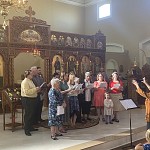Saint David, Bishop of Wales
Commemorated on March 1
David is said to have been born on a clifftop near Capel Non (Non’s chapel) on the South-West Wales coast during a fierce storm. Both his parents were descended from Welsh royalty. He was the son of Sandde, Prince of Powys, and Non, daughter of a chieftain of Menevia (now the little cathedral town of St David’s). The site of Davids birth is marked by the ruins of a tiny ancient chapel close to a holy well and the more recent 18th century chapel dedicated to his mother Non can still be seen near St. David’s Cathedral.
In medieval times it was believed that St David was the nephew of King Arthur. Legend has it that the patron saint of Ireland, St. Patrick – also said to have been born near the present-day city of St. David’s – foresaw the birth of David in approximately 520AD.
The young David grew up to be a priest, being educated at the monastery of Hen Fynyw under the tutorage of St. Paulinus. According to legend David performed several miracles during his life including restoring Paulinus’ sight. It is also said that during a battle against the Saxons, David advised his soldiers to wear leeks in their hats so that they could easily be distinguished from their enemies, which is why the leek is one of the emblems of Wales!
A vegetarian who ate only bread, herbs, and vegetables and who drank only water, David became known as Aquaticus or Dewi Ddyfrwr (the water drinker) in Welsh. Sometimes, as a self-imposed penance, he would stand up to his neck in a lake of cold water, reciting Scripture! It is also said that milestones during his life were marked by the appearance of springs of water.
Becoming a missionary David traveled throughout Wales and Britain and even made a pilgrimage to Jerusalem where he was consecrated bishop. He founded 12 monasteries including Glastonbury and one at Minevia (St. Davids) which he made his bishop’s seat. He was named Archbishop of Wales at the Synod of Brevi (Llandewi Brefi), Cardiganshire in 550.
Monastery life was very strict, the brothers having to work very hard, cultivating the land and pulling the plow. Many crafts were followed – beekeeping, in particular, was very important. The monks had to keep themselves fed as well as provide food and lodging for travelers. They also looked after the poor.
St David died on 1 March 589A.D., at Minevia, allegedly over 100 years old. His last words, according to the Buchedd Dewi, were: "Be steadfast, brothers, and do the little things." His remains were buried in a shrine in the 6th-century cathedral which was ransacked in the 11th century by Viking invaders, who plundered the site and murdered two Welsh bishops.
After his death, his influence spread far and wide, first through Britain and then by sea to Cornwall and Brittany. In 1120, David was canonized a Saint. Following this, he was declared Patron Saint of Wales. Such was David’s influence that many pilgrimages were made to St. David’s. Fifty churches in South Wales alone bear his name. He has been venerated as one of the greatest and most beloved saints of the British Isles.
In 1996 bones were found in St. David’s Cathedral, which are thought to be of the Dewi himself.
A Prayer to St. David, Bishop of Wales
O God, who graciously bestowed on Your
Bishop Saint David of Wales
the virtue of wisdom and the gift of eloquence,
and made him an example of prayer and pastoral zeal;
grant that, through his intercession,
Your Church may ever prosper and render You joyful praise.
Through our Lord Jesus Christ, Your Son,
Who lives and reigns with You
in the unity of the Holy Spirit,
one God, for ever and ever.
Amen.
Another Prayer
God our Father,
You gave the bishop David to the Welsh Church
to uphold the faith
and to be an example of Christian perfection.
In this changing world may he help us to hold fast to the values
which bring eternal life.
Through our Lord Jesus Christ, Your Son,
Who lives and reigns with You
in the unity of the Holy Spirit,
one God, forever and ever.
Amen.
Holy Hierarch David, pray to God for us!


